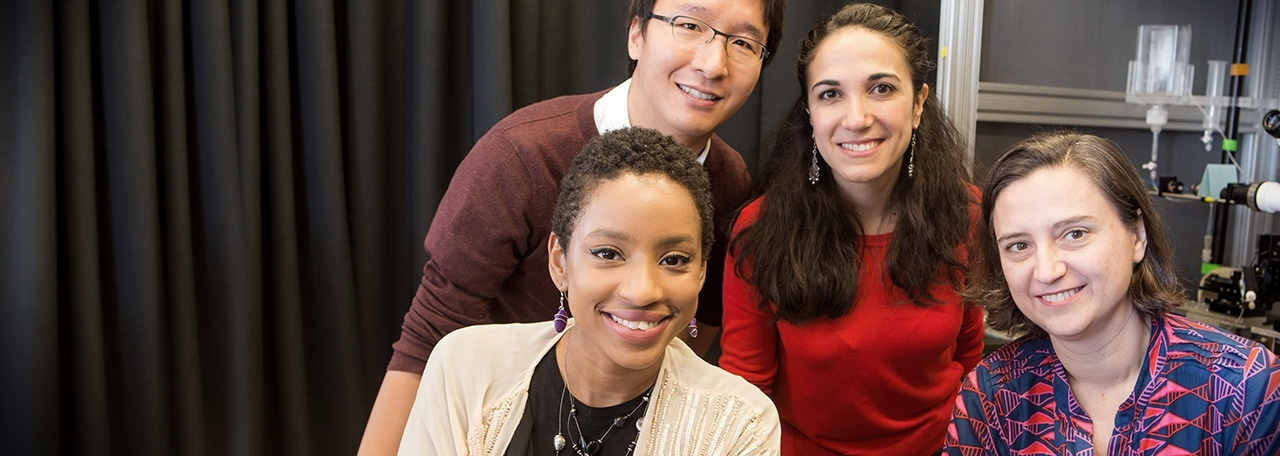Recruitment Initiatives
The Department of Neuroscience at Hopkins is committed to providing safe and supportive research training environments in neuroscience at all levels.
We recognize the need for diligent, continuous efforts to create and support a broad community of neuroscientists in order to generate the most creative and innovative science.
More than a decade ago, the department spearheaded efforts to encourage people of a broad range of backgrounds to come to Hopkins for graduate school, postdoctoral fellowships, staff and faculty positions. These initial efforts have evolved and grown. Today, Hopkins Neuroscience hosts two engaged committees, the Department of Neuroscience Committee on Trainee Affairs (CTA) and the Student Trainee Committee (STC). The CTA consists of faculty members, postdoctoral fellows and graduate students and meets approximately every two months to plan and coordinate various initiatives. The STC, which consists entirely of graduate students, was founded in 2017 to organize the large number of students committed to recruitment and outreach. The STC works jointly with the CTA as well as independently on its own initiatives, all with the common goal of improving recruitment and outreach in Hopkins Neuroscience as well as in the broader scientific community. The committees also coordinate outreach efforts to the broader community around Baltimore and to area schools.
We believe that the most creative communities include representatives from a broad range of perspectives who actively support and learn from one another. We welcome you to join our program and further our commitment to the recruitment of trainees from a range of backgrounds.
-
Neuroscience CTA committee participation for graduate students
-
Committee on Trainee Affairs (CTA) Eligibility criteria:
• The CTA Executive committee consists of 4 faculty (one of whom will be the Chair), 4 postdocs and 4 students.
• The CTA Admissions subcommittee consists of 4 faculty and 2 students.
• The CTA Summer Internship Program subcommittee consists of 4 faculty and 2 students.
• Students are eligible to serve on the committees during years 2 through 5 for up to 2 years.
• Students joining in year 5 can only serve for 1 year. Eligibility is dependent on receiving written approval from their PI and consent of the Program Directors.
• If more than students want to serve than spots that are available, the members of the committee will be selected at the beginning of the academic year by a vote of all the graduate students who have completed their first year.
-
-
Summer Internship Program (SIP)
-
The Summer Internship Program (SIP) provides an immersive 10-week research program in laboratories at Johns Hopkins. The Department of Neuroscience supports these summer internships for undergraduate students considering graduate studies in neuroscience and related areas. Supported by the Kavli Neuroscience Discovery Institute (Kavli NDI), NeuroSIP students intern in laboratories of primary faculty members in the Department of Neuroscience that are members of Kavli NDI. SIP students are guided by faculty mentors in independent research projects and present their work at a poster session at the end of the summer as part of an institution-wide symposium. The projects that SIP students take on are an opportunity to learn about the research process and give students a sense of ownership of their original work. Many go on to present their summer research at national conferences such as ABRCMS, SACNAS, and LANS, among others.
Learn more
-
-
Post-baccalaureate Research Education Program (PREP)
-
PREP provides post-baccalaureate students with the support to work full-time in a laboratory at Hopkins. PREP students spend one or two years strengthening their research background and increasing their competitiveness for PhD applications via exam preparation, scientific writing workshops, once-a-month chalk-talks, and “mini-thesis” meetings with their research mentors and the PREP director. Graduate students in our department also serve as peer mentors for students in the PREP program and help guide the students both in and out of the lab. Learn more.
Learn more
-
-
Accepted Students’ Second Look Visit
-
The Neuroscience Department supports the Second Look/Accepted Applicant’s Visit for all students accepted across Hopkins’ Graduate Biomedical Education Programs. The main goal of this event is to present what Johns Hopkins and Baltimore have to offer, discuss student life with current students, and continue networking with faculty and students in each applicant’s respective graduate program. All students that have been extended an offer to join the Neuroscience Graduate Program are invited to attend this event. This event typically takes place at the end of March. You can reach out to Dr. Andrea Young, Assistant Dean for Graduate Biomedical Education, for additional information (ayoung90-at-jhmi.edu).
The date for this year’s Accepted Applicants’ Virtual Visit (Second Look Visit) is March 27, 2025 starting at 11am. There will be events scheduled throughout the day going until about 7:30pm. Interested students will be able to attend the entire event or only the portions they choose/that work for their schedules. The Accepted Applicants Visit is intended to provide a more extensive and personal look at the resources we have that support the development and success of doctoral students. All prospective doctoral students who are interested are welcome to attend.
-
-
Graduate Life Advisor
-
In 2019, the Committee on Trainee Affairs named eight faculty members to the role of “Graduate Life Advisor,” a mentorship role designed to improve the breadth of graduate student mentorship. These faculty members nominated by students provide advice on everything graduate-school related beyond lab work - this can include navigating professional relationships, maintaining healthy work-life balance, and broader career strategies.
Learn more
-

